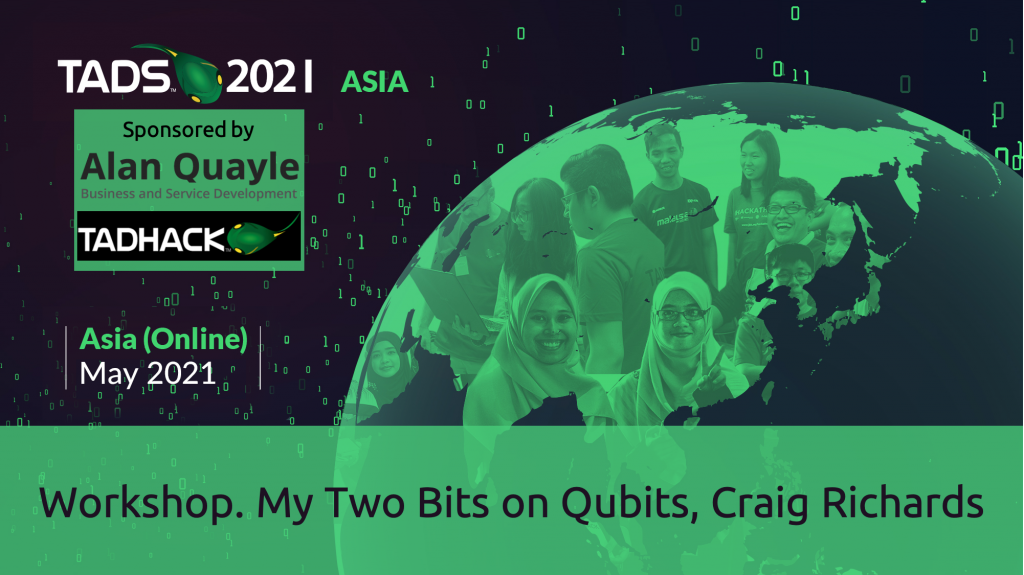Video
Outline: My Two Bits on Qubits
Craig Richards, TADSummit and TADHack supporter since the beginning of TADS.
- What is Quantum Computing
- The huge potential for Quantum Computing
- How is Quantum Computing Different
- What problems can Quantum Computing Solve
- Quantum Computing is real and it is here now!
- Quantum Computing Realities
- Applications in Communications
Workshop Review
Every year TADSummit runs workshops across a range of topics not directly in the domain of programmable communications, though relevant, including:
- Design Thinking & Effectuation by Philippe Vayssac, CIO, Groupama.
- Web 3 by a number of presenters including David Dias, Ben Parsons, Dean Bubley, and Paulo Chainho.
- Privacy by Simon Woodhead. Though the presentation title was ‘Securing my Space Genitalia’!
This year’s workshop focus is quantum computing. Craig is a supporter of TADSummit and TADHack since the beginning of TADS in 2013. He’s been studying the area of quantum computing for a number of years, and brings a much needed practical perspective to this emerging technology. You’re going to see some live quantum computing demos in this workshop! It’s a massive and complex topic, but Craig helps you find your initial steps.
Craig sets out the timeline for the evolution of quantum computing in two phases, 1980-2000, which is laying the theoretical foundations; and 2000-2020 which is hardware realization and making those resources available online for developers to hack with, this is why the timing is now to understand quantum computing as its now available to everyone.
Craig compares quantum and classical computing. With classic we have the 2 states of 1 and 0. With quantum computing each state is represented by a vector of 2 complex numbers (remember a+bi where i is the square root of -1). Some of the quantum computing functions include not just AND, OR, NOT, but also pairing and superposition (adding quantum states together to create another valid quantum state).
Don’t worry about the math, Craig will keep it practical with some great demos using the IBM Quantum experience. This practical demo for me made the operations of quantum computing much clearer. We’re in the exploration phase of finding algorithms that can take advantage of quantum computing’s unique capabilities, and where there is an advantage against classic computing there’ll be $$ available. The systems available online are small, 5-15 qubits, but things are changing fast.
Craig gives a good review of its current status and limitations of quantum computing. He highlights its rapid evolution, with 100 qubit systems being used for private research, that could soon be available to you and I. Most importantly Craig shares the resources he recommends to help you get up to speed fast in quantum computing.
Thanks Craig for an excellent and practical guide to quantum computing. If you’d like to ask Craig any questions, please either contact him directly or ask questions in the comments section of this weblog.


Thanks for such a practical review of quantum computing 🙂 I have a few questions:
1) What algorithms or problems in telecoms do you think quantum computing could possibly impact? Much is said of breaking encryption.
2) I’ve always thought the optimization, especially real-time optimization, was a good fit for quantum computing. In second making recommendations, where the results of which can be measured. Would network optimization be application areas?
3) 5-15 qubits seems good for learning, but how many qubits do you think are necessary for you or I to do something interesting, that is possibly commercial?
Hi Alan,
I think there is definitely opportunity for quantum computing in optimising network planning and capacity/usage optimisation. There is large area of quantum computing we didn’t get to cover, quantum networking and Quantum Key Distribution (QKD). There are already a number of operational Quantum networks, mostly government initiatives.
https://en.wikipedia.org/wiki/Quantum_network
Some other interesting links
https://www.zdnet.com/article/toshiba-targets-quantum-key-encryption-business-with-verizon-bt-partnerships/
https://www.zdnet.com/article/quantum-key-distribution-could-seal-the-5g-rift-with-china-say-engineers/
https://www.discovermagazine.com/technology/the-quantum-internet-will-blow-your-mind-heres-what-it-will-look-like
Number of qubits require?, that is a tough question. There is a grocery store in Canada that already has a usable optimisation from QC.
https://www.insidequantumtechnology.com/news-archive/quantum-computers-are-coming-pioneer-user-a-canadian-a-grocery-chain-save-on-foods/